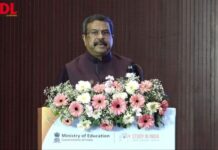 After carving out of Jharkhandas a separate state in 2000, the Jharkhand Education Project Council (JEPC) was constituted in 2001. JEPC, an autonomous body works as a State Implementation Society (SIS) to pursue the goals of universalisation of elementary education (UPE). The council has been involved in implementing various programmes like the Sarva Shiksha Abhiyan (SSA), District Primary Education Programme (DPEP), UN-aid etc with the defined objectives. A state which has a literacy rate of 54.13%, female literacy rate still lower at 39.38% and is dominated by tribal languages like Santhali, saw a real awakening in the education sector in 2002.The awakening came when not a single student in 22 government-run schools passed the state board examination for Class 10 in 2002. The reason for government to worry was obvious, especially since it spends an average of Rs.90,000 a month to run each school. Jharkhand has 1,245 state-run high schools. Meeting Education for All Challenge Continuing with the awakening the state has taken great steps in improving literacy rates and education through information communication technologies (ICTs). Building on these efforts, United States Agency for International Development (USAID), India, the Education Development Center and resource partners developed a project to improve the reach and quality of primary school education in Jharkhand. The Technology Tools for Teaching and Training (T4) in India project provides teachers with inservice training to improve content and methods, and multichannel instruction in English, Math and Science using media ranging from interactive radio to mobile video unit.
After carving out of Jharkhandas a separate state in 2000, the Jharkhand Education Project Council (JEPC) was constituted in 2001. JEPC, an autonomous body works as a State Implementation Society (SIS) to pursue the goals of universalisation of elementary education (UPE). The council has been involved in implementing various programmes like the Sarva Shiksha Abhiyan (SSA), District Primary Education Programme (DPEP), UN-aid etc with the defined objectives. A state which has a literacy rate of 54.13%, female literacy rate still lower at 39.38% and is dominated by tribal languages like Santhali, saw a real awakening in the education sector in 2002.The awakening came when not a single student in 22 government-run schools passed the state board examination for Class 10 in 2002. The reason for government to worry was obvious, especially since it spends an average of Rs.90,000 a month to run each school. Jharkhand has 1,245 state-run high schools. Meeting Education for All Challenge Continuing with the awakening the state has taken great steps in improving literacy rates and education through information communication technologies (ICTs). Building on these efforts, United States Agency for International Development (USAID), India, the Education Development Center and resource partners developed a project to improve the reach and quality of primary school education in Jharkhand. The Technology Tools for Teaching and Training (T4) in India project provides teachers with inservice training to improve content and methods, and multichannel instruction in English, Math and Science using media ranging from interactive radio to mobile video unit.
The Edusat satellite, built by the Indian Space Research Organisation (ISRO), is wholly dedicated to meet the needs of the education sector in this part of the country. The Edusat network provides six exclusive channels for primary, secondary, higher education, technical education and e-Governance. ASSERT – Association for Social Engineering, Research and Training, in association with EDC has developed an educational CD for computer-based usage. AED-Academy for Educational Development, an International NGO working in the strategic use of computers in educational processes in the Hazaribagh region. It utilises multimedia information and communication technologies to
develop simple reading books in both Hindi and English. Vikas Bharathi – NGO involved in community-based education and development activities conducts teacher orientation training. Vidya Vahini, the Intranet and Internet project launched by the Department of Information Technology and Ministry of Communications and Information Technology, Government of India contributes to schools to provide IT n Education in Hazaribagh district of Jharkhand.
English Is Fun in Jharkhand
The English Is Fun, the Interactive Radio Instruction (IRI) series developed by EDC was adapted for radio broadcast in Jharkhand that consisted of 132 programmes broadcast daily throughout the school year to 300 schools in three districts: Ranchi, Hazaribagh and Sarai Kala. A total of 6000 schools in 5
districts are now being covered under the IRI broadcast.
Government and budget
The budgetary outlay for education sector in the state has been increased 20.55 % to INR 1773.11 cr in 2005-06 in comparison to the previous year. Girls’ education is encouraged through abolishing tax till post graduation level. This apart, INR 183.38 cr allocation in the budget for the mid-day meal programme, and announcement of some more schemes show the strong supportive mind of the state government in the education sector.






















